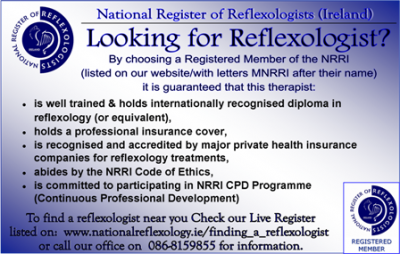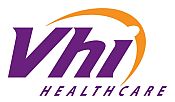LOOKING FOR REFLEXOLOGIST? >>CLICK HERE>>
REFLEXOLOGY AND BABIES
By Lorraine Hughes, MNRRI
I am still a relatively young Reflexologist, having qualified in September 2005, so it's no surprise that the areas that I am most drawn to in my infancy as a practitioner are babies and children. For this article, I am going to focus on babies and reflexology.
I've recently started working on babies here in Ennis and I am so struck by the prevalence of asthma and ezcema, usually combined. Babies are having such difficulty sleeping because there is so much stuff going on in their heads literally! It's all chest infections and sinuses that I am coming across with other issues cropping up from time to time.
Some of the research I'm unearthing is so excited and vociferous about Reflexology and Babies that it seems like it could be the next revolution in alternative healthcare. Reflexology is very beneficial for babies. They generally respond to treatment very quickly as they don't have the same build up of stresses and strains within their bodies as adults do.
Some conditions which have been treated with regular reflexology include:
• Colic, wind and constipation
• Asthma
• Teething
• Catarrh
• Glue ear
• Coughs and colds
• Reflux
• Anxiety
• Sleeplessness
In terms of age, it can start around 6 weeks and go up to 2 years because any age after that you're going to be spending most of the time chasing the toddler around the room!
Babies seem to respond to reflexology more quickly because their energy flow is more easily unblocked and proper balance can be restored. Their feet are so pure and unchartered.
There are some points to remember when using reflexology on babies. The most obvious is that their feet are much smaller than an adult's feet. The reflex points are much closer together so minimal finger movement around the foot is required. Babies' feet are not fully formed, so the pressure needs to be gentle and nurturing. And finally, the sessions will be much shorter than a normal session of 50 minutes.
The other difference between doing a baby's feet and doing an adult's feet is that when a baby withdraws his feet in a determined fashion his have had enough. This needs to be respected and more often than not that is the end of the session for the moment. It can be resumed at a later stage.
It's also useful to keep in mind the appropriate times to do babies' feet. Most babies have some sort of routine running through their day, be it one of the famous Contented Little Baby Routines devised by Gina Ford or some other daily routine that they might be following. Therefore it's best to do a reflexology session before a nap or after the baby's evening routine or bath right before bedtime. They will be most relaxed and ready at these times and the other benefit of these times is that the session can lead onto a very restful and relaxed sleep for the baby and a welcome break for the parent or parents.
Some of the research has suggested using a small dab of baby foot cream as a sort of ‘cushion' between your fingers and the feet. With or without the cream, the gentle reflexology session will be giving enormous support in the body's natural ability to move into balance. (The NRRI Code of Practice precludes the use of cream during treatment - Editor)
Here is a quick summary of the Caution Care Reminders for a Baby Reflexology session:
1. Keep your touch light
2. Work in smaller areas
3. Warm your hands before touching the baby's feet
4. Work briefly
5. Read the sign that the baby has had enough
6. During cold spells or winter, keep the baby's feet warm & comfortable by using socks (as the towel tends to get moved around a lot and won't stay on the foot)
Baby Reflex is a concept developed in England by reflexologist and physiotherapist Jenny Lee who has done research on childhood asthma and reflexology with some great results for young children.
Jenny teaches Baby Reflex to parents and grandparents for them to use with babies while at home or out and about. Jenny is a qualified childcare and community worker so her courses are very popular as she is a skilled trainer who teaches the technique in a single session of 2 hours. Jenny has found that babies love the attention of having their feet rubbed and it's a wonderful ‘bonding' tool for parent and child.
In the case of asthma, reflexology and continuous but gentle work on the respiratory system reflex points can complement other interventions. I think combined approaches will strengthen the lungs and diaphragm to function more efficiently and enhance a baby's experiences as they grow. It is encouraging to know that asthma often stops at puberty.
As mentioned earlier, in my own work on babies in Ennis, I am dealing with babies who have asthma and eczema and / or trouble sleeping through the entire night. Picking random cases, I have found that the babies in question responded very positively to the reflexology sessions and checking with parents later, they have definitely found an improvement in their babies' health and in their subsequent sleep patterns.
Obviously at the start there was some resistance and curiosity from the babies about me as a visiting practitioner to their homes with nothing with me but a little tub of foot cream (to be used only at the end of the session). I always ask that a parent sits on the couch with the baby on their lap and an ample supply of distracting items - anything from a mobile phone to a TV remote, to a bottle of milk, whatever works for that child.
I try to keep the session embedded in the baby's natural home environment as much as possible and this might even mean keeping the TV on during the session. The key is to distract the baby from noticing too much newness or strangeness in their environment as this may upset them even before I go near their feet and work on any reflex points.
I start with the relaxation techniques gently on each foot and then I put a sock on the left foot as I start the session on the right foot. The babies I work on react to the following points with what I can only describe as a sense of mild discomfort and curiosity mixed together:
• Sinuses
• Lungs and Diaphragm
They are very easily comforted and soothed by reflexology on the following areas:
• Relaxation techniques but not necessarily the combing technique
• Heart relaxation technique at times
• Spine
• Spinal nerves
• Lymph system - lower and upper (this is particularly popular)
Sleeplessness is a major problem for babies and the overall relaxation benefits of reflexology seems to help with this. Overtiredness is often a result of overstimulation. An overtired baby reaches a stage where he is unable to drift off to sleep naturally and the more tired he becomes the more he fights sleep. It has been suggested that no baby under 3 months should be allowed to stay awake for more than 2 hours at a time (Ford, 2006).
Babies and reflexology seem to be a good match for each other and I hope that the list of websites below will be of some use to practitioners for further reading. I'm a firm believer in trying to encourage alternative approaches for babies and children's health because anything that can reduce GP visits has to be a welcome development, especially for parents with babies who have recurring health issues or minor complaints that could be treated with reflexology.
By Lorraine Hughes, MNRRI
References & Bibliography
Ford, Gina. The New Contented Little Baby Book. Vermilion. 2006
Wright, Janet. Reflexology and Acupressure. Octopus Publishing Group. 1999
www.bigfoottherapies.co.uk Baby Reflex. 2008
www.bumpbabyandbeyond.com Reflexology. 2008
www.happyfeetreflexology.co.uk Reflexology for Babies and Children. 2008
www.mindbodyandsole.com Maternity Reflexology. 2008
www.solework.wordpress.com Foot Notes. 2008


 Our Objectives
Our Objectives CPD Programme
CPD Programme




